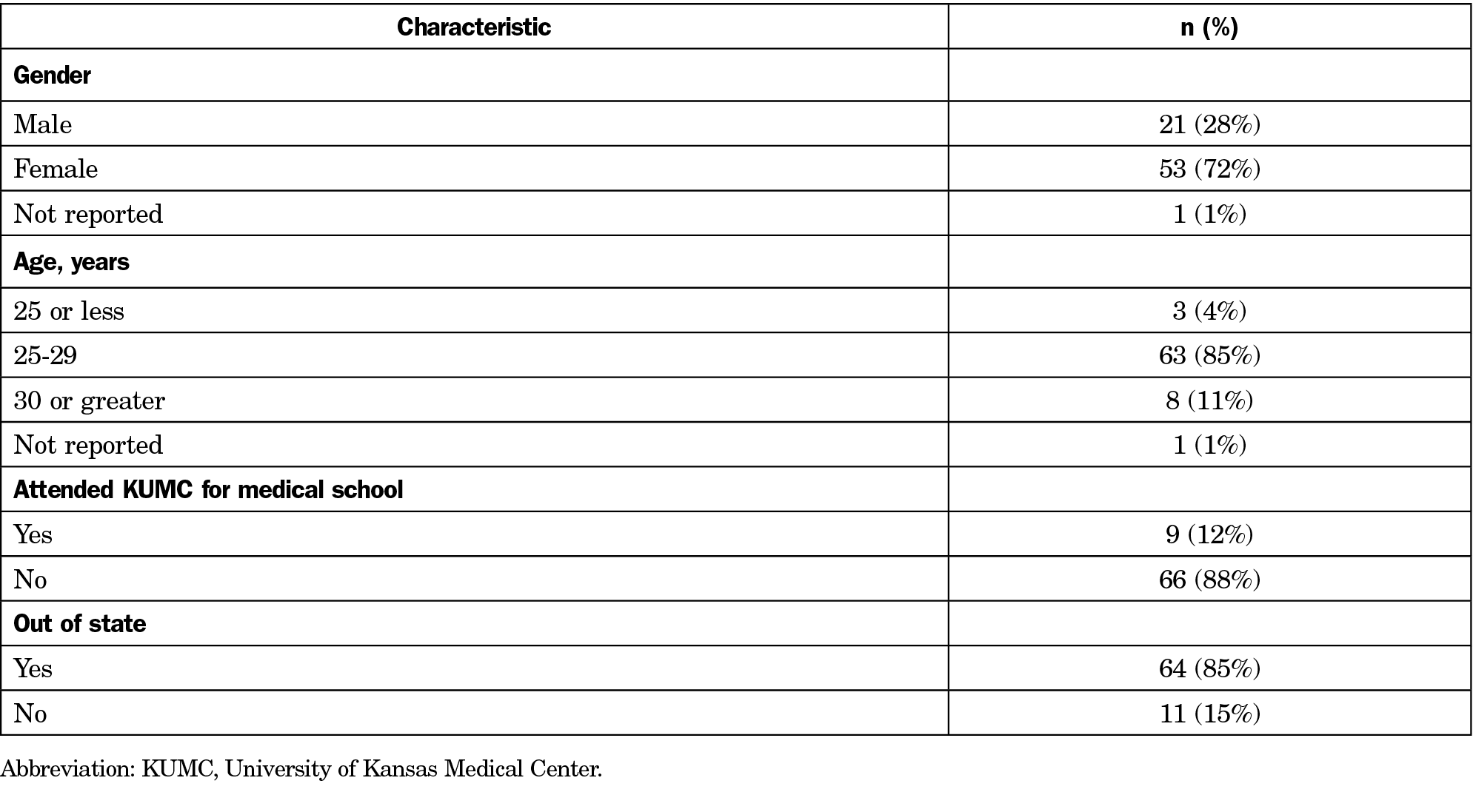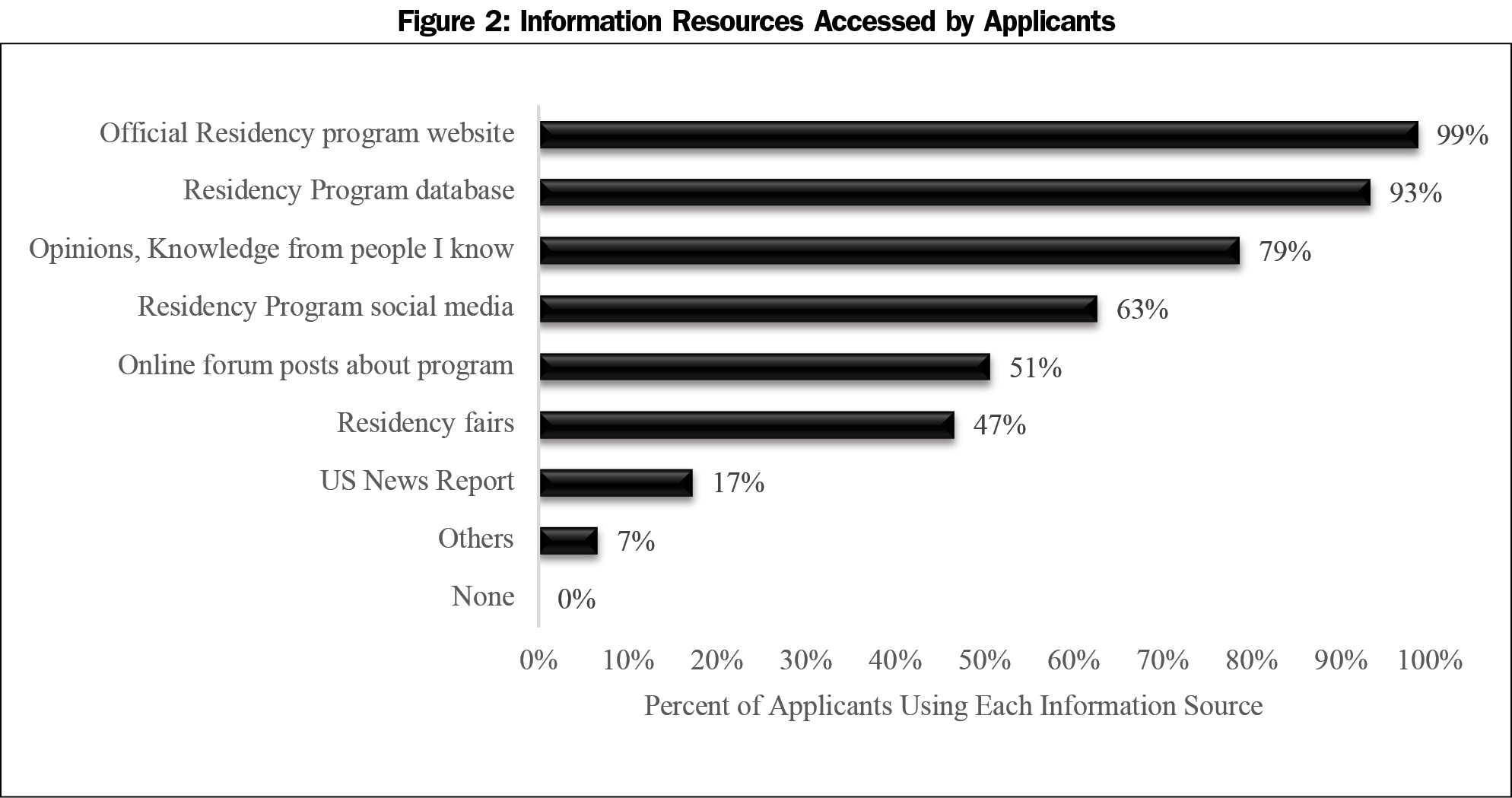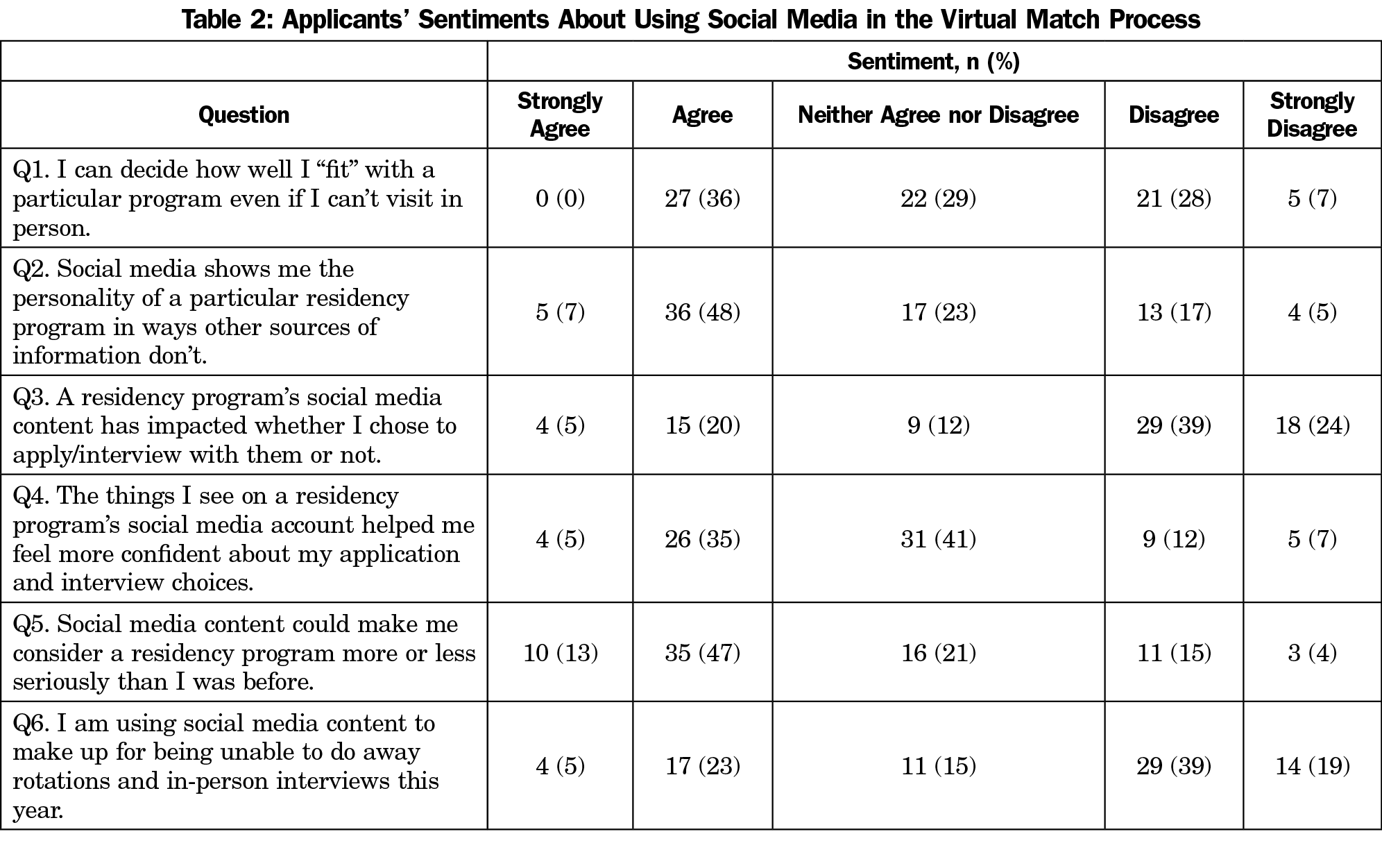Background and Objectives: Virtual residency interviews during the 2020 COVID-19 pandemic posed unique challenges to students and residency programs in the United States. We evaluated fourth-year medical students’ perceptions of the virtual format and social media use to help select residency programs. We also assessed applicant utilization and perceived usefulness of our social media content.
Methods: We administered an anonymous, web-based survey study of interviewees at an urban, academic medical center residency program. We analyzed data using descriptive statistics.
Results: Seventy-five of 138 applicants completed the survey (response rate 54%). Most applicants reported worry about obtaining enough information about residency programs to apply (64%) and to rank programs (87%). Though more traditional information sources remain most prevalent, social media is now widely used to research residency programs (62%).
Conclusions: Most applicants to this family medicine residency program used social media to gather information, but they expressed worry that it was enough. Virtual interviews are likely to remain postpandemic, creating challenges for residency programs and especially for their hopeful applicants. Programs seeking to provide well-rounded information for applicants should maintain a social media presence as part of their recruitment practices.
The traditionally in-person format for the residency Match was altered in 2021, replaced with a virtual format. New formats may alter how medical students and residency programs approach the Match system, allowing for innovation. One area for growth is social media—internet-based platforms providing users a space to share and/or interact with one another’s content—though the efficacy and value of using it to convey residency program information are unclear and warrant further investigation.1,2
The proportion of programs with a social media presence varies between specialties; studies show social media use in graduate medical education (GME) in its infancy.3-7 Professional organizations are recommending programs establish a social media presence, given that medical students frequently use social media, even to research residency programs.2,3, 6-10 Residency social media pages can be difficult to find, and the available content is inconsistent across programs and specialties.6-9
Little is known about whether or how students applying to family medicine are utilizing social media as a source of information about residency programs. The 2020-2021 Match cycle’s virtual format led to prolific innovation in graduate medical education recruitment. Even as pandemic-era regulations are relaxing, our field could retain valuable progress in accessibility and recruitment.12
This study had two purposes: (1) evaluating fourth-year medical student perceptions about perceived preparedness for the virtual Match, and (2) assessing applicant utilization of social media content.
Population
Our family medicine residency program (FMRP) is at a Midwestern, urban academic medical center. This study was a cross-sectional descriptive survey of FMRP applicants who accepted interviews during the 2020-2021 National Residency Match Program (NRMP) cycle. We collected data via an anonymous electronic survey distributed via email.
Survey Design and Implementation
We created a novel, 26-item electronic survey, due to a lack of preexisting validated tools. Survey content included demographics, sentiments about the virtual Match, and sentiments about social media use as information gathering. “Official” social media represents content released by the organization it describes. We sent initial survey distribution emails within 14 days after each applicant’s scheduled interview date, and a reminder was emailed to all applicants after the season’s final interview. We calculated descriptive statistics using Microsoft Excel. This study was approved by the University of Kansas Medical Center Institutional Review Board.
Sample Characteristics
All 138 applicants that scheduled an interview were contacted. We received 83 responses; eight were excluded due to incomplete responses (75 completed surveys, 54% response rate). Ten applicants cancelled their interview, but their data could not be excluded due to participant anonymity. Respondent characteristics are summarized in Table 1.
Applicant Sentiments About the Virtual Match
Applicants reported being worried about the virtual Match process (Figure 1); 64% worried about getting enough information to decide to interview with a residency program, and only 52% felt they have enough options of individual sources of information about programs. Almost all (87%) participants worried about having enough information to know how to rank programs. Only 16% of applicants felt confident that the virtual format would not influence their Match outcomes.
Applicant Sentiments About Social Media for Match Information
The top-three information sources applicants used (Figure 2) were official residency program websites, program databases, and opinions/knowledge from peers. Official program social media was the fourth most-used source (63%). Within social media at the FMRP, applicants used Instagram most often (75%), followed by Facebook (25%), then Twitter (23%).
Survey items also interrogated applicant perspectives on the role of social media as an information source in the residency application process (Table 2). Only 36% felt they could determine individual fit with a program without visiting in person. About half (55%) of respondents agreed, however, that social media shows the personality of programs, distinct from other resources. Most applicants (60%) agreed that social media content could change their consideration of a program. Only a minority of applicants (25%) reported social media already having affected a decision to apply to a program. Social media increased the confidence in their residency choice in many (40%) of participants. Most applicants (57%) disagreed that social media could replace the information provided by completing visiting medical student rotations or in-person interviews.
A majority of participants worried they would have enough information to choose their residency program, and few were confident that the virtual 2020-2021 NRMP residency application cycle would not impact their outcomes. Social media was the fourth most-utilized source of information about programs, and, thus, should not be ignored as a recruitment opportunity. While few students used social media content as a deciding factor for whether they apply, it helped them feel more confident in their choices.
Instagram is currently the preferred platform, although this is likely to change as applicant demographics and media preferences evolve. Social media reached many students, being the fourth most-used source of information about residency programs. Though social media is better at illuminating some elements of a program (such as “personality,” the gestalt impression of a program’s culture and/or values), applicants do not perceive that social media replaces in-person contact, nor did it seem overwhelmingly influential in ranking or applying to a program.
This study has limitations. Our results are from one Midwestern, academic medical center residency program, and may not generalize to all programs. Despite anonymity, applicants may not have responded candidly during the high-stakes process. Nonresponse bias is also possible with our 54% response rate.
Future work examining frequency of social media use, attitudes at different institutions, or variation between demographic subgroups would be valuable. Additionally, further delineation of which social media content applicants find helpful would promote more impactful social media engagement. Residency programs should develop best practices for social medical content and trainee engagement.
Family medicine residency programs must prepare for future virtual residency Match cycles, as the post-COVID pandemic era has likely changed the interview process forever. Data-informed practices would not only improve the efficacy of social media as a recruiting platform, but also help applicants feel more confident about their choices about family medicine programs.
Acknowledgments
The authors gratefully acknowledge the efforts of Dr Marla Tobin for her sage mentorship throughout the completion of this project, and Dr Daniel Parente for his technological mastery and editing assistance.
Financial Support: The American Academy of Family Physicians Foundation Emerging Leaders Institute awarded a $1,000 scholarship to Dr Oliver.
Conflict Disclosure: Both authors were involved in interviewing and ranking residency applicants in the 2020-2021 cycle for the Kansas University Family Medicine Residency Program.
References
- Bhayani RK, Fick L, Dillman D, Jardine DA, Oxentenko AS, O’Glasser A. Twelve tips for utilizing residency program social media accounts for modified residency recruitment. MedEdPublish. 2020;9(1):178. doi:10.15694/mep.2020.000178.1
- Sterling M, Leung P, Wright D, Bishop TF. The use of social media in graduate medical education: a systematic review. Acad Med. 2017;92(7):1043-1056. doi:10.1097/ACM.0000000000001617
- Al-khersan H, Tanenbaum R, Lazzarini TA, Patel NA, Sridhar J. A Characterization of ophthalmology residency program social media presence and activity. J Acad Ophthalmol. 2020;12(2):E110-E114. doi:10.1055/s-0040-1714682
- Charkhchi P, Sahraian S, Beheshtian E, Carlos RC, Yousem DM, Sair HI. Missed opportunity: neuroradiology training programs and social media. [published online ahead of print, 2019 Mar 5]. AJR Am J Roentgenol. 2019;212(5):1-6. doi:10.2214/AJR.18.20707
- Renew JR, Ladlie B, Gorlin A, Long T. The impact of social media on anesthesia resident recruitment. J Educ Perioper Med. 2019;21(1):E632. Published 2019 Jan 1.
- St Claire KM, Rietcheck HR, Patel RR, Dellavalle RP. An assessment of social media usage by dermatology residency programs. Dermatol Online J. 2019;25(1):13030/qt5v62b42z. https://escholarship.org/uc/item/5v62b42z doi:10.5070/D3251042611
- Fick L, Palmisano K, Solik M. Residency program social media accounts and recruitment – a qualitative quality improvement project. MedEdPublish. 2020;9(1):203. doi:10.15694/mep.2020.000203.1
- Schweitzer J, Hannan A, Coren J. The role of social networking web sites in influencing residency decisions. J Am Osteopath Assoc. 2012;112(10):673-679.
- Emanuelli E, Korentager RA, Butterworth J. Abstract 5: #Matched: The Impact of Residency Program’s Social Media on Prospective Applicants, Plastic and Reconstructive Surgery - Global Open: May 2020 - Volume 8 - Issue 5S - p 3 doi:10.1097/01.GOX.0000672536.43708.ea
- Irwin TJ, Riesel JN, Ortiz R, Helliwell LA, Lin SJ, Eberlin KR. The Impact of Social Media on Plastic Surgery Residency Applicants, Annals of Plastic Surgery: April 27, 2020 - Volume Publish Ahead of Print – Issue. doi:10.1097/SAP.0000000000002375
- Khadpe J, Singh M, Repanshek Z, Brumfield E, Guirgis F, Kalynych C, et al. Barriers to Utilizing Social Media Platforms in Emergency Medicine Residency Programs. Cureus. 2019;11(10):e5856. Published 2019 Oct 7. doi:10.7759/cureus.5856
- Pillow MT, Hopson L, Bond M, et al; Council of Residency Directors Social Media Task Force. Social media guidelines and best practices: recommendations from the Council of Residency Directors Social Media Task Force. West J Emerg Med. 2014;15(1):26-30. doi:10.5811/westjem.2013.7.14945
- Hammoud MM, Standiford TC, Carmody JB. The 2020-2021 Residency Application Cycle: Lessons Learned and Lingering Problems. JAMA. 2021;325(22):2249-2250. doi:10.1001/jama.2021.5708







There are no comments for this article.